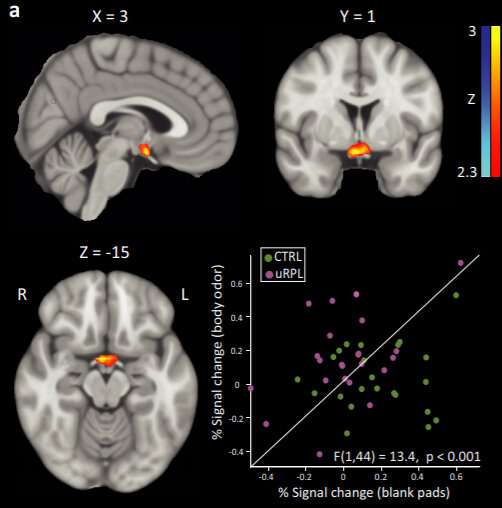Repeated pregnancy loss may be tied to the olfactory system

The odors we give off are a sort of body language—one that may affect our relationships more than we realize. New research from the lab of Prof. Noam Sobel at the Weizmann Institute of Science suggests this 'chemical communication' may extend to human reproduction as well. The study, which was published today in eLife, found that women who suffer from a condition known as unexplained repeated pregnancy loss (uRPL) process messages concerning male body odor in a different way than other women. These findings may point to new directions in the search for causes and prevention of this poorly understood disorder.
Sobel and his team in the Institute's Neurobiology Department thought that some cases of uRPL could be related to a human variation on the Bruce effect, named after its discoverer Hilda Bruce, who found in 1959 that when pregnant mice are exposed to the body-odor of a a male that did not father the pregnancy, they will almost always abort. Why this occurs is not fully understood, but the common rational is that the female 'chooses' to abort because the chemical message is that a new "more fit" male is in town.
Could a similar effect occur in women? A remarkable estimated 50% of all human conceptions and some 15% of documented human pregnancies, end in spontaneous miscarriage. Ethical considerations obviously prevented the researchers from repeating the Bruce experiments in humans; But the team instead sought circumstantial evidence.
For the Bruce effect to occur in mice, the female must remember the body-odor of the fathering male. To test for this in humans, the researchers presented participants with three odorants: one extracted from a t-shirt worn by their spouse, and two from t-shirts worn by non-spouse men. They found that women with uRPL were able to identify their spouse by smell, while the control women could not. When retested with ordinary odorants to see if those with uRPL simply had a better sense of smell overall, they tested only marginally better. The ability of uRPL women to identify their spouse by smell was remarkable: In another part of the experiment, in which the women did not know what odors they would be smelling, "several of these women said 'oh, my husband's in here'," says research student Reut Weissgross, who co-lead the study. This never happened once with the control women.
Further testing suggested that these women are not just better at picking out the smell of their spouse, they may experience men's body-odor in a different way altogether. When asked to rate men's body-odors on various scales, including ranking them by standard scales for pleasantness and intensity, but also by such factors as fertility or sex appeal, the uRPL-affected women were unique in the way they described and graded the smells, and significantly different from control women in their answers.
In the final phase of the research, the experimenters used both structural and functional brain imaging to study these women. The structural imaging revealed that women with uRPL have smaller olfactory bulbs; these are the initial brain-relay for smell. Using functional imaging, they found an increased response to men's body-odors in the hypothalamus of women with uRPL. The hypothalamus plays a key role in the Bruce effect in mice, and it is a brain region that participates, among other things, in coordinating pregnancy and overall hormonal regulation.
"It seems these losses of pregnancy may be 'unexplained' because physicians are looking for problems in the uterus, when they should also be looking in the brain, and particularly the olfactory brain" says Weissgross. Sobel cautions: "Correlation is not causation, so our findings do not prove in any way that the olfactory system, or body-odors, cause miscarriage. But our findings do point to a novel and potentially important direction for research in this poorly managed condition."
More information: Liron Rozenkrantz et al. Unexplained repeated pregnancy loss is associated with altered perceptual and brain responses to men's body-odor, eLife (2020). DOI: 10.7554/eLife.55305


















